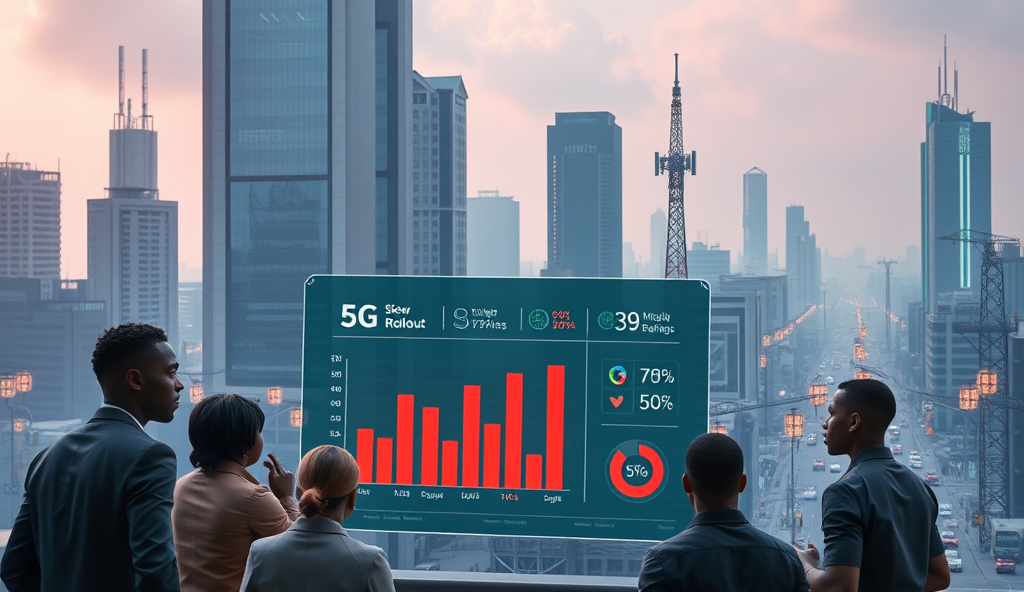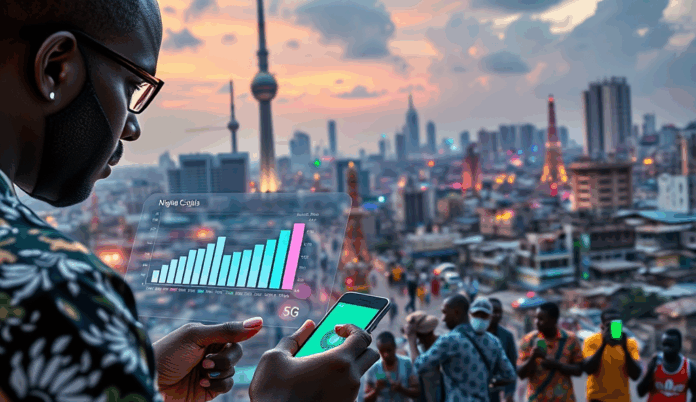Introduction to 5G Rollout in Nigeria
Nigeria’s 5G rollout marks a pivotal shift in the telecom landscape, with MTN and Airtel leading the charge after the NCC’s successful spectrum auction in 2021. The initial deployment focused on major cities like Lagos and Abuja, where infrastructure readiness aligns with high demand for faster connectivity.
This phased approach reflects both opportunity and challenge in scaling 5G network deployment in Nigeria nationwide.
Telecom operators face unique hurdles, including fiber optic shortages and power instability, which complicate 5G technology adoption in Lagos and beyond. Despite these barriers, early speed tests show download rates exceeding 300Mbps, signaling transformative potential for Nigerian businesses.
The next section will explore how these technical advancements translate into tangible benefits for stakeholders.
Regulatory frameworks and public-private partnerships remain critical to overcoming the challenges of 5G implementation in Nigeria. As operators expand coverage, lessons from MTN’s 5G launch in Nigeria highlight the need for collaborative infrastructure investments.
These developments set the stage for a deeper examination of 5G’s capabilities in the following overview.
Key Statistics

Overview of 5G Technology and Its Benefits
Nigeria’s 5G rollout marks a pivotal shift in the telecom landscape with MTN and Airtel leading the charge after the NCC’s successful spectrum auction in 2021.
5G technology represents a quantum leap from 4G, offering ultra-low latency (under 1ms), peak speeds up to 20Gbps, and massive device connectivity—critical for Nigeria’s growing IoT and smart city ambitions. These advancements enable real-time applications like remote surgery and autonomous vehicles, which could revolutionize sectors such as healthcare and logistics in Lagos and Abuja.
Beyond speed, 5G network deployment in Nigeria promises enhanced spectral efficiency, allowing telecom operators to serve more users with existing infrastructure. For Nigerian businesses, this translates to seamless cloud computing, high-definition video conferencing, and improved supply chain automation, addressing persistent productivity gaps.
As MTN’s 5G launch in Nigeria demonstrates, early adopters gain competitive advantages through superior service quality and innovation potential. The next section will analyze how these theoretical benefits manifest in the current rollout status across major telecom providers.
Current Status of 5G Rollout by Telecommunication Companies in Nigeria
5G technology represents a quantum leap from 4G offering ultra-low latency (under 1ms) peak speeds up to 20Gbps and massive device connectivity—critical for Nigeria’s growing IoT and smart city ambitions.
Following MTN’s pioneering 5G launch in Nigeria, the telecom giant has expanded coverage to Lagos, Abuja, and Port Harcourt, achieving speeds up to 1Gbps in select areas. Airtel and Glo are in active testing phases, with Airtel securing additional spectrum licenses to accelerate its 5G network deployment in Nigeria by mid-2024.
The NCC 5G spectrum auction has seen mixed participation, with only MTN and Mafab Communications securing licenses in 2021, highlighting challenges of 5G implementation in Nigeria, including infrastructure costs and regulatory hurdles. Despite this, MTN reports over 500,000 subscribers on its 5G network, signaling growing demand for high-speed connectivity in urban centers.
As rollout progresses, Nigerian businesses in Lagos and Abuja are already leveraging 5G technology adoption for IoT solutions and cloud-based operations. The next section will explore the key players driving this transformation and their strategic investments in Nigeria’s telecom infrastructure for 5G.
Key Players in Nigeria’s 5G Rollout
MTN remains the dominant force in Nigeria’s 5G rollout with its network now live in Lagos Abuja and Port Harcourt serving over 500000 subscribers and achieving peak speeds of 1Gbps.
MTN remains the dominant force in Nigeria’s 5G rollout, with its network now live in Lagos, Abuja, and Port Harcourt, serving over 500,000 subscribers and achieving peak speeds of 1Gbps. Airtel, having secured additional spectrum licenses, is aggressively testing its 5G network deployment in Nigeria, targeting a mid-2024 commercial launch to compete with MTN’s early-mover advantage.
Mafab Communications, the other licensee from the NCC 5G spectrum auction, is gradually building its infrastructure, though its rollout pace lags behind MTN’s. Glo, while yet to secure a 5G license, is conducting trials to position itself for future spectrum allocations, reflecting the competitive dynamics shaping Nigeria’s telecom infrastructure for 5G.
These key players are driving 5G technology adoption in Lagos and Abuja, where businesses increasingly rely on high-speed connectivity for IoT and cloud solutions. However, their progress faces hurdles, which the next section will explore in detail.
Challenges Facing 5G Deployment in Nigeria
Despite MTN’s rapid 5G network expansion and Airtel’s aggressive testing high infrastructure costs and limited fiber backhaul remain major barriers with tower upgrades costing up to $30000 per site in Lagos.
Despite MTN’s rapid 5G network expansion and Airtel’s aggressive testing, high infrastructure costs and limited fiber backhaul remain major barriers, with tower upgrades costing up to $30,000 per site in Lagos. Power instability and vandalism further complicate deployments, forcing operators to rely on expensive diesel generators for uptime guarantees.
Spectrum allocation delays and right-of-way issues with state governments slow rollout timelines, as seen in Mafab’s slower progress compared to MTN’s early-mover advantage. Consumer affordability is another hurdle, with 5G devices priced beyond the reach of 60% of Nigeria’s population, limiting subscriber growth despite network availability.
These operational and economic challenges highlight the need for regulatory interventions, which the next section will examine in detail regarding government policies and incentives for 5G adoption.
Regulatory Framework and Government Support for 5G in Nigeria
Nigeria’s 5G rollout timeline remains fluid with industry projections suggesting nationwide coverage by 2028 contingent on resolving device affordability and infrastructure gaps highlighted in earlier sections.
The Nigerian Communications Commission (NCC) has taken steps to address 5G rollout challenges, including the 2021 spectrum auction that allocated 3.5GHz bands to MTN and Mafab, though delayed licensing hindered Mafab’s deployment. To ease infrastructure costs, the federal government introduced tax waivers for 5G equipment imports and streamlined right-of-way fees to N145 per linear meter, though inconsistent state-level implementation persists.
Despite these efforts, power subsidies and fiber backhaul investments remain critical gaps, with operators still bearing 70% of diesel costs for tower uptime. The NCC’s recent partnership with InfraCos aims to expand fiber coverage to 60% of Lagos and Abuja by 2025, but vandalism and permitting delays continue to slow progress.
As regulatory interventions evolve, their effectiveness will shape consumer adoption, which the next section explores in relation to device affordability and service demand. The government’s proposed device financing schemes could bridge the affordability gap for Nigeria’s 5G market.
Consumer Readiness and Market Demand for 5G in Nigeria
Despite regulatory efforts to accelerate 5G network deployment in Nigeria, consumer adoption remains constrained by high device costs, with 5G-enabled smartphones priced at an average of ₦250,000—nearly 30% of the median annual income. MTN’s 5G launch in Nigeria has seen limited uptake outside urban hubs like Lagos and Abuja, where only 18% of subscribers currently own compatible devices.
The NCC’s proposed device financing schemes could boost 5G technology adoption in Lagos and other cities, mirroring Kenya’s success with pay-as-you-go smartphone models. However, service demand hinges on operators addressing pricing concerns, as current 5G data plans cost 40% more than 4G equivalents despite marginal speed improvements in early speed tests.
As Airtel’s 5G plans for Nigeria take shape, consumer education campaigns will be critical to demonstrate practical benefits beyond faster downloads. These demand-side challenges directly influence the timeline for nationwide 5G coverage, which the next section examines alongside infrastructure milestones.
Future Prospects and Timeline for Full 5G Deployment in Nigeria
Nigeria’s 5G rollout timeline remains fluid, with industry projections suggesting nationwide coverage by 2028, contingent on resolving device affordability and infrastructure gaps highlighted in earlier sections. MTN and Airtel’s expansion plans indicate prioritized urban deployments, targeting Lagos and Abuja for 80% coverage by 2025, while rural areas may lag due to lower ROI.
The NCC’s 2024-2027 infrastructure roadmap aims to bridge this gap, with planned tower upgrades and spectrum allocations to support 5G technology adoption in Lagos and secondary cities. However, persistent challenges like fiber backhaul limitations and power instability could delay full deployment beyond current estimates.
As operators refine pricing strategies and device financing models, consumer uptake will determine whether Nigeria meets its 5G ambitions or faces prolonged 4G-5G coexistence. These dynamics set the stage for evaluating the overall state of Nigeria’s 5G rollout in the concluding section.
Conclusion on the State of 5G Rollout in Nigeria
Nigeria’s 5G rollout has made significant strides since the NCC spectrum auction, with MTN and Airtel leading deployment in Lagos and Abuja, yet coverage remains limited to urban centers. The challenges of infrastructure gaps and high device costs persist, slowing nationwide adoption despite growing demand for faster connectivity.
Telecom operators must prioritize tower upgrades and partnerships to expand 5G network deployment in Nigeria beyond major cities. With only 12% of towers currently 5G-ready, achieving the NCC’s 2025 target will require accelerated investment and regulatory support.
The impact of 5G on Nigerian businesses is already visible in sectors like fintech and healthcare, but sustained growth hinges on addressing power reliability and fiber optic shortages. As rollout expands, collaboration between stakeholders will be crucial to bridge the digital divide.
Frequently Asked Questions
What are the most cost-effective strategies for upgrading existing towers to support 5G network deployment in Nigeria?
Consider phased upgrades starting with high-traffic urban sites and leverage Huawei's AirPON solution to reduce fiber dependency by up to 40%.
How can telecom operators address the power instability challenges affecting 5G implementation in Nigeria?
Deploy hybrid power solutions combining solar panels with lithium batteries like Flexenclosure's eSite to cut diesel consumption by 60-80%.
What regulatory incentives should we push for to accelerate 5G technology adoption in Lagos and other cities?
Advocate for extended tax holidays on 5G equipment imports and standardized state-level right-of-way fees below N100 per linear meter.
How can we make 5G devices more affordable to boost subscriber growth in Nigeria?
Partner with device manufacturers on trade-in programs and installment plans like MTN's Device Financing Scheme offering 12-month payment terms.
What fiber backhaul solutions work best for expanding 5G coverage beyond major cities in Nigeria?
Deploy microwave solutions like Ceragon's FibeAir IP-20C for rural areas and prioritize partnerships with InfraCos for shared fiber infrastructure.


